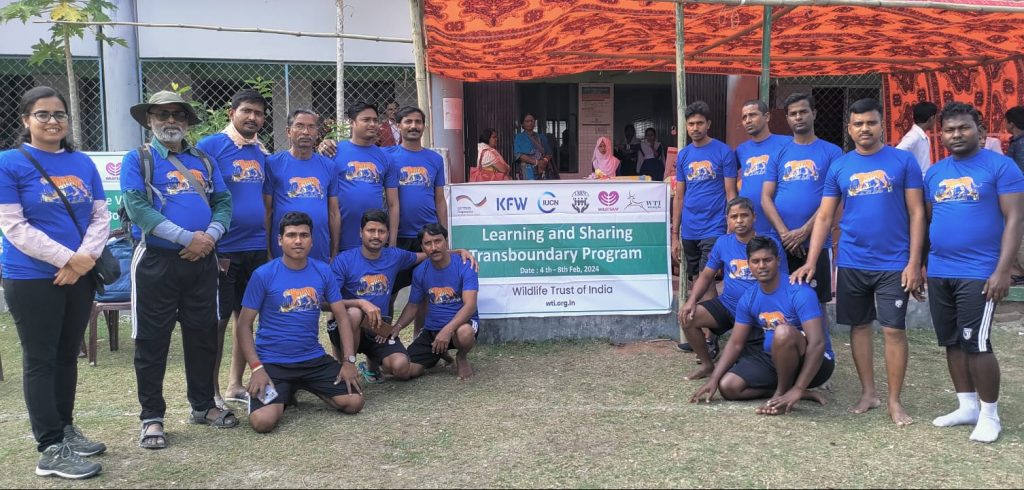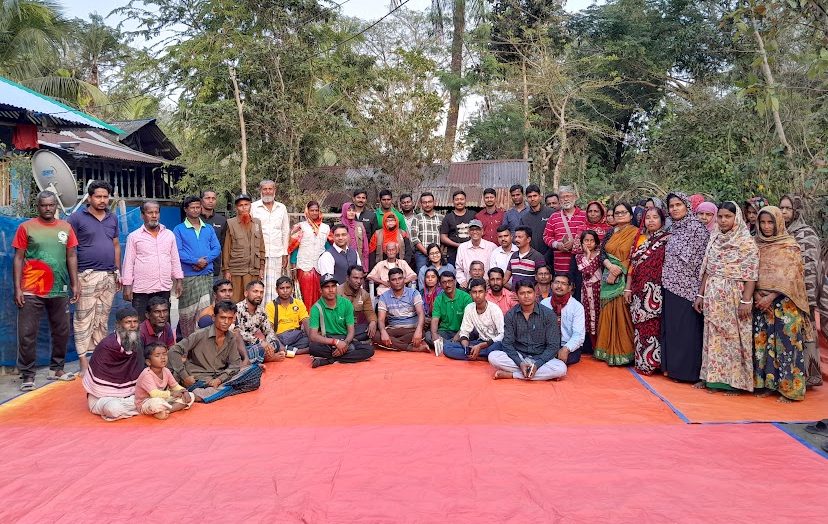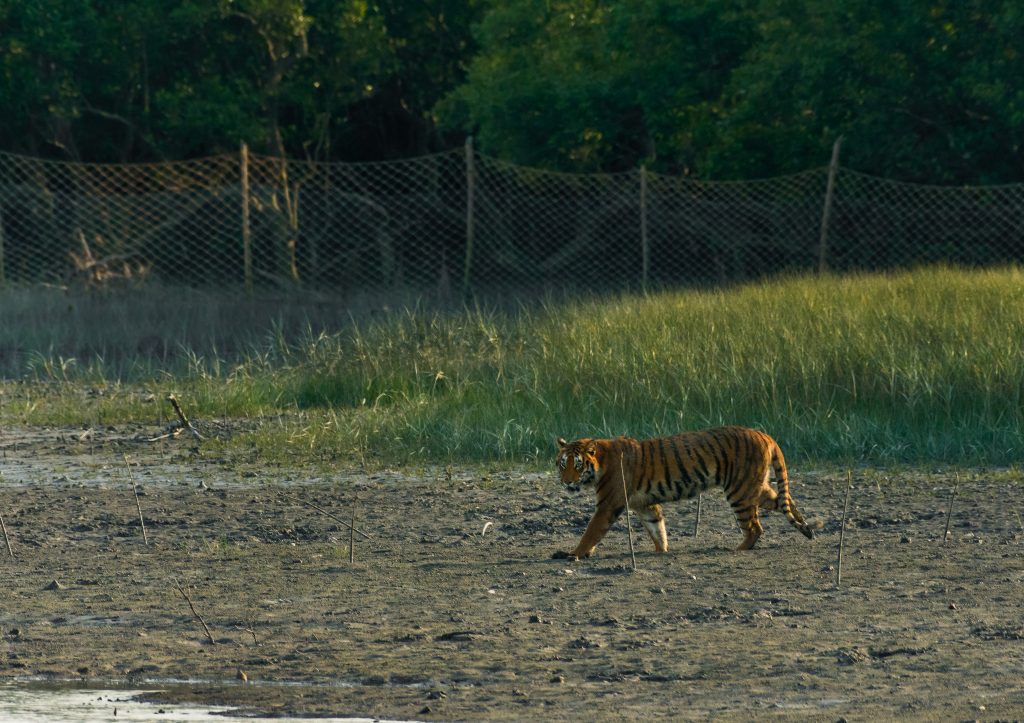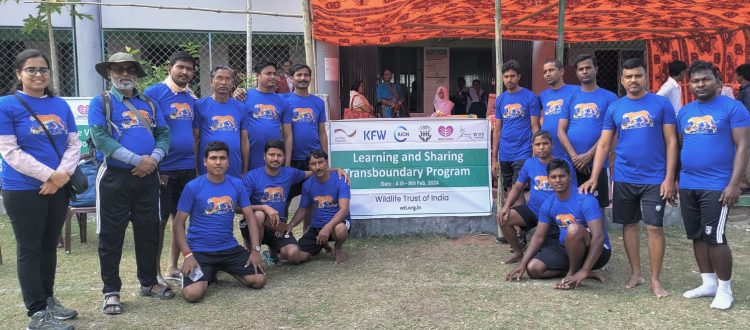WTI organises four-day cross-border Tiger Conservation Workshop in Bangladesh Sundarbans
Joymoni, 12th Feb, 2024: Wildlife Trust of India (WTI) in partnership with the Lokamata Rani Rashmoni Mission (LRRM), West Bengal and WildTeam, Bangladesh, organised a transboundary community engagement learning and sharing workshop. The workshop was hosted between the 4th and 8th February 2024, at Joymoni, Bagerhat District, Bangladesh.
The Sundarbans, straddling both India and Bangladesh, is the largest mangrove forest in the world and home to the iconic Bengal tiger. However, this is also a landscape that witnesses regular human-tiger conflicts, due to continued anthropogenic pressure on the forests. Recognising the need for joint efforts to address conservation challenges, WTI and WildTeam orchestrated this unique exchange program, facilitating the sharing of knowledge and experiences among key stakeholders. 12 school students appointed as Tiger Scouts from Madhya Purba Adarsha Gurguria village of Kultali block along with their teachers and members of WTI’s Primary Response Team (PRT) known as ‘Bagh Bondhus’ from the local community of Kultali block in South 24 Parganas, joined the workshop.

Trans-boundary engagement under Sundarbans Tiger Project | Photograph by Prosenjit Sheel/WTI
The primary goal of the visit was to encourage mutual learning and information exchange between India’s Tiger Scouts, Primary Response Team members, Bagh Bondhus and local community representatives. The trans-boundary visit provided a platform for sharing best practices in wildlife management, including anti-poaching strategies, habitat monitoring, and community engagement. Both India and Bangladesh have faced challenges related to poaching and habitat degradation, and the exchange aimed to identify effective solutions through collaborative brainstorming. The involvement of Bagh Bondhus, local community members from both nations, added a community-centric dimension to the initiative. Discussions on sustainable livelihoods, ecotourism, and the role of local communities in conservation were integral to the agenda.
The participants also engaged in joint field excursions, exploring diverse ecosystems within the Sundarbans. These excursions provided opportunities for hands-on learning, where members shared their expertise in tracking, monitoring, and conservation activities. Workshops were conducted to facilitate in-depth discussions on conservation strategies, addressing the challenges faced by both nations. Experts from WTI and WildTeam led the sessions on the latest technological advancements in wildlife monitoring and habitat protection.

Transboundary community engagement learning in Bangladesh | Photograph by WildTeam, Bangladesh
Mr. Prosenjit Sheel, Project head of Sundarban Tiger Project, WTI, noted that the concerted efforts of the organisation’s PRTs and Bagh Bondhus, collaborating closely with the West Bengal Forest Department, have safeguarded the local community from tiger attacks while also protecting the lives of the Bengal Tigers in the Sundarbans. The WTI field team and the West Bengal Forest Department respond to every tiger incident that emerges in the region, thereby protecting the interests of the local community and biodiversity conservation, added Mr. Samrat Paul, Field Officer, Sundarban Tiger Project, WTI.
WildTeam’s CEO, Prof. Dr. Md. Anwarul Islam, stated that “children are the future assets of any country and equipping them with proper knowledge about the Sundarbans will enable them to pass it on to the next generation, thereby ultimately supporting the wildlife conservation of Sundarban in the near future”. Beyond the boundaries of wildlife conservation, a friendly football match was organized in Joymoni, Mongla, Chandpai Range under Bagerhat District, aimed to promote team spirit and strengthen the bond between the Tiger Scouts and Response Teams of both nations.

Bengal tiger spotted near a fringe village in Sundarban mangroves (India) | Photograph by Satyaki Naha
Lauding the activities of the WildTeam to build a bridge between locals and tigers and other wild animals in the world’s largest mangrove forest in Bangladesh Sundarban, DFO (East Sundarban), Bangladesh, Mr. Nurul Karim, in his speech during the inauguration ceremony appreciated the dedication of the young and energetic Tiger Scouts of India and Bangladesh. He offered to provide opportunities to these enthusiastic Tiger Scouts to contribute in their respective roles which will ensure a bright future for both the countries.
“This trans-boundary visit stands testament to the collaborative spirit needed for effective wildlife conservation. By bridging borders and sharing expertise, this initiative contributes to a more unified and robust approach towards safeguarding the biodiversity of the Sundarbans and promoting sustainable coexistence between humans and wildlife” added, Dr. Abhishek Ghoshal, Manager and Head of the Human-Wildlife Conflict Mitigation Division, WTI.
The Sundarban Tiger Project is supported by West Bengal Forest Department and IUCN, KfW, German Co-operation under the Integrated Tiger Habitat Conservation Program (ITHCP). Know more about the project here.









